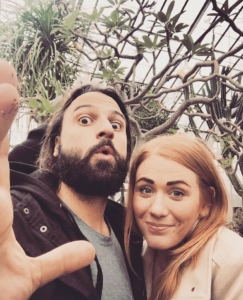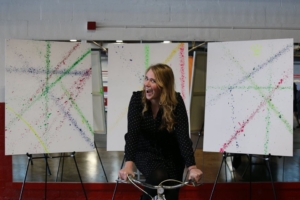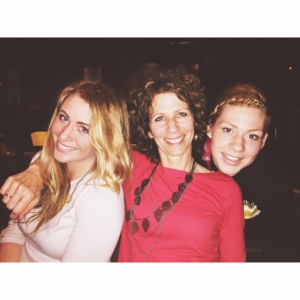Tell us about living in Detroit. What neighborhood do you live in and what makes your neighborhood unique?
 Well I grew up in Detroit, on the east side in a neighborhood called Morningside. After graduating high school in 2007 I moved to Midtown and since I’ve lived in Woodbridge, Eastern Market, Mexicantown, and currently in Corktown. I appreciate the neighborhood I grew up in a lot — it turned out to be a pretty great place to raise a family. We walked to school, knew all of our neighbors, dealt with little crime, and were able to experience and learn from the diversity in our community.
Well I grew up in Detroit, on the east side in a neighborhood called Morningside. After graduating high school in 2007 I moved to Midtown and since I’ve lived in Woodbridge, Eastern Market, Mexicantown, and currently in Corktown. I appreciate the neighborhood I grew up in a lot — it turned out to be a pretty great place to raise a family. We walked to school, knew all of our neighbors, dealt with little crime, and were able to experience and learn from the diversity in our community.
Corktown is great, it’s walkable, friendly, and “hip”. It’s got a unique mix of longtime residents and newcomers, creating a lot of diversity in age which is important to preserving the history of the neighborhood.
What have you learned from Challenge Detroit so far?
I was interested in the Challenge Detroit opportunity last spring because I was feeling very comfortable and uninspired in the position I was in. Challenge Detroit has given me the opportunity to expand on and deepen my existing relationships in Detroit, meet new people and explore new avenues of creativity, and engage weekly with like-minded individuals that I look forward to growing with.
Tell us about your host company and your role in the organization.
 My host company is Slow Roll. Slow Roll is a nonprofit that hosts the largest weekly bike ride in Michigan (and beyond). It has evolved into a social movement that brings together thousands of individuals from all different backgrounds to explore Detroit by bike. Coincidentally, I have been friends with and lived next door to the founder, Jason Hall, since before Slow Roll even began, almost 7 years ago. It’s been incredible to watch the ride evolve from a few friends Slow Rolling to Slow Jams, to this, now a monumental weekly occasion, attracting thousands of riders from across the region.
My host company is Slow Roll. Slow Roll is a nonprofit that hosts the largest weekly bike ride in Michigan (and beyond). It has evolved into a social movement that brings together thousands of individuals from all different backgrounds to explore Detroit by bike. Coincidentally, I have been friends with and lived next door to the founder, Jason Hall, since before Slow Roll even began, almost 7 years ago. It’s been incredible to watch the ride evolve from a few friends Slow Rolling to Slow Jams, to this, now a monumental weekly occasion, attracting thousands of riders from across the region.
My role is truly a unique one. I am the first full-time employee of the organization, so I guess you could call me a Jack of all trades. Jason and I work together on securing sponsorship, planning rides, coordinating venues, etc. I do all of the social media and general communications with the community and our members; I also work with all our nonprofit partners, we are putting a huge amount of effort into connecting our riders with other philanthropic and volunteer opportunities within the city. The audience Slow Roll has is incredible — now, let’s empower that audience and educate them about the city, put them in touch with organizations that need them, teach them about the history of certain neighborhoods, and thoughtfully connect them to one another.
What kind of impact do you hope to have with your host company and within the city?
Where to begin…. my role with Slow Roll is an opportunity most people never ever get. In the last six months I’ve been in the position to create the structure the organization lacked, which has been extremely challenging but such an incredible learning experience.
 I come from a long history of Detroit doers. My grandmother was in the first Leadership Detroit class and raised her 6 sons in Rosedale Park. My parents both grew up in the city and raised their four children on the eastside of Detroit in the 1990s. Before starting his own development company, my dad worked for the City of Detroit as the Civic Center Deputy Director, served on a number of local nonprofit boards, was a Leadership Detroit grad, amongst a number of other accomplishments. He developed the first new mixed-use loft building in Detroit in 1999. He rode his bike back and forth to work (~12 miles) way before cycling was cool or commonplace. Unfortunately, he passed away in 2008, and as the city is changing rapidly, I often think about the silent impact of his work.
I come from a long history of Detroit doers. My grandmother was in the first Leadership Detroit class and raised her 6 sons in Rosedale Park. My parents both grew up in the city and raised their four children on the eastside of Detroit in the 1990s. Before starting his own development company, my dad worked for the City of Detroit as the Civic Center Deputy Director, served on a number of local nonprofit boards, was a Leadership Detroit grad, amongst a number of other accomplishments. He developed the first new mixed-use loft building in Detroit in 1999. He rode his bike back and forth to work (~12 miles) way before cycling was cool or commonplace. Unfortunately, he passed away in 2008, and as the city is changing rapidly, I often think about the silent impact of his work.
I have always been inspired by my family’s contributions to the city and I feel honored to continue the legacy of doing good work in Detroit. This year I am utilizing my Challenge Detroit Impact Project as a way to build off a project I’ve been working on recently, titled “In Our Lifetime”. This has been an opportunity for me to explore my dad’s professional career, meet colleagues of his, and truly understand his philosophy of development in Detroit. The ultimate goal is to create a short film that demonstrates how to thoughtfully develop Detroit’s changing neighborhoods using Colin Hubbell’s approach to development — one of inclusivity, creative thinking, and love.
What are you most looking forward to this spring and summer in Detroit?
Summer in Detroit is the most incredible thing. You’re in a city, it’s warm, you can ride bikes everywhere, we’re surrounded by water, let me go on!
I am really looking forward to May 1st — Slow Roll’s first ride of the season. I’ve been working really, really hard since September on understanding the ins and outs of Slow Roll, its impact, the logistics of the ride, etc., as well as creating better avenues of communication, building relationships with corporations and nonprofits, and organizing a ride that will intentionally connect our riders to Detroit in a variety of ways. I CANNOT wait to see my hard work pay off, really.
What do you envision for Detroit 10 years from now?
I have no idea. I want to be optimistic, but to be honest, sometimes I am terrified. I have been here my whole life, so I can sometimes fall into that “old Detroit”, “ours not yours” mentality when experiencing rapid change and blissfully ignorant newcomers. But it is, now more than ever, so important to be thoughtful about our development. Sustainability is key. I shouldn’t have to pay $1,200 a month for a one bedroom apartment in a city where I can’t hop on a reliable source of public transit, send my child to public school, or access an affordable grocery store.
Detroit is hip. Hip is good — we need young, hip people. We need people to buy houses, pay taxes, support local businesses, eat, work, and play in Detroit. However, history must be preserved. We must tell the stories of the people in the neighborhoods. My mom paid us $1 an hour to pass out fliers in our neighborhoods every month for the block clubs she hosted. It’s people like her that have kept these neighborhoods alive, never ever feeling defeated, despite how many bicycles were stolen from our garage.
Detroit is and has been a commitment. Living here has been a sacrifice in many ways – high taxes, lots of crime, poor city services, bad schools, etc. But the spirit of Detroit’s people who kept this place alive is everything.
I hope in 10 years that it’s not such a commitment to live here. I hope I can raise my own children here without sending them to private schools and I can afford to put my car insurance at my actual address.
To learn more about Kelsey’s life in Detroit as a Challenge Detroit Fellow check out her spotlight video below.
